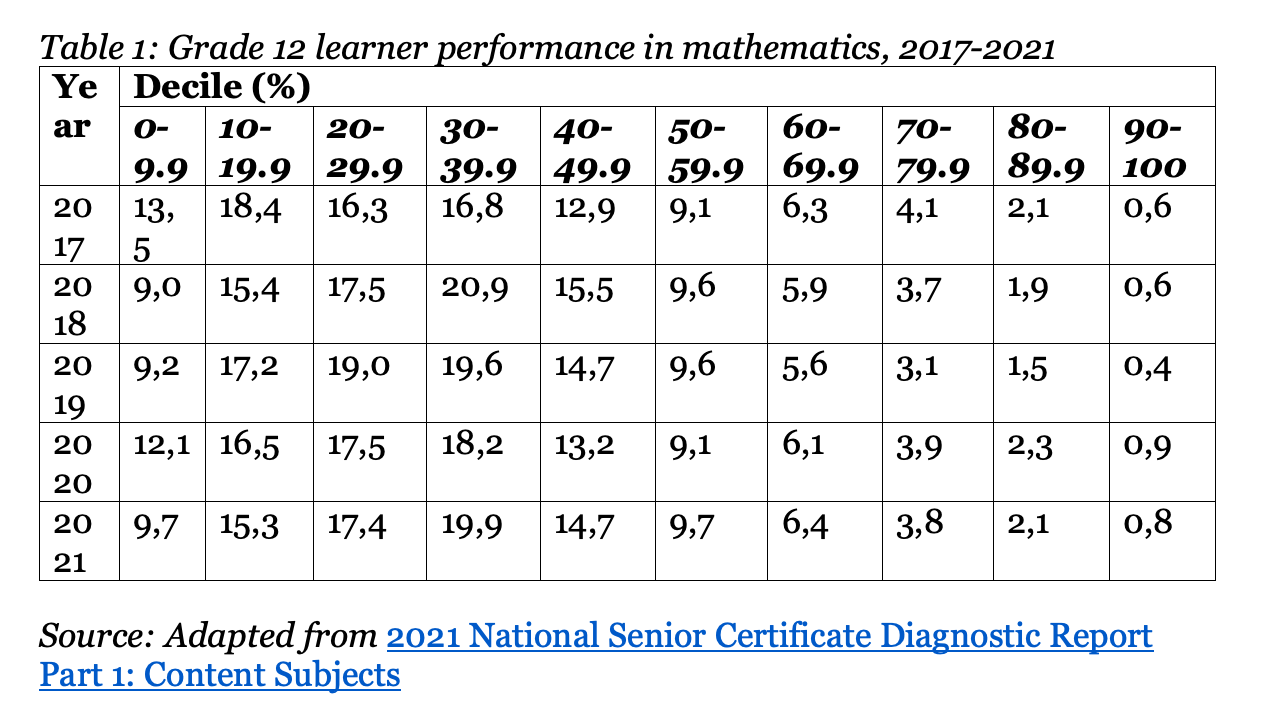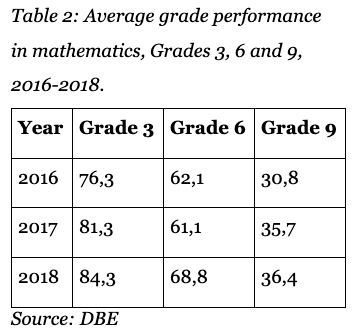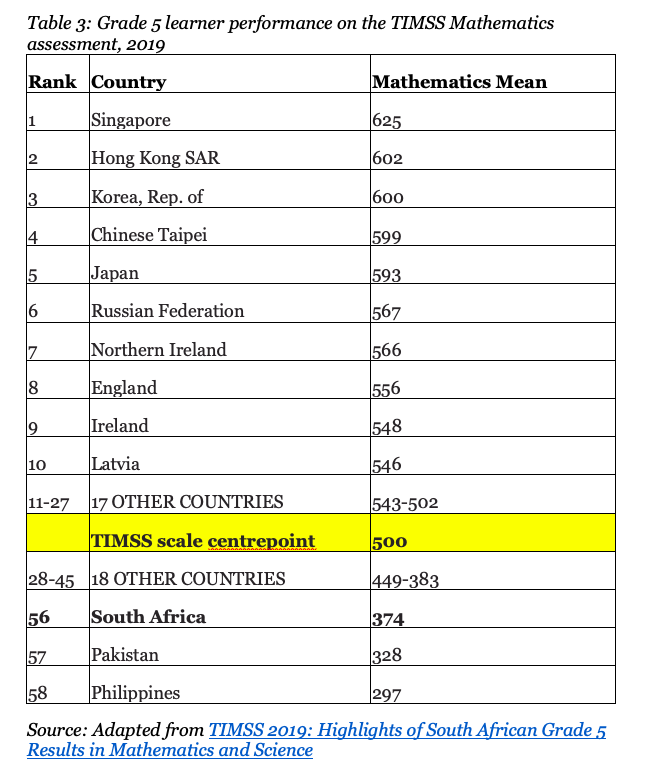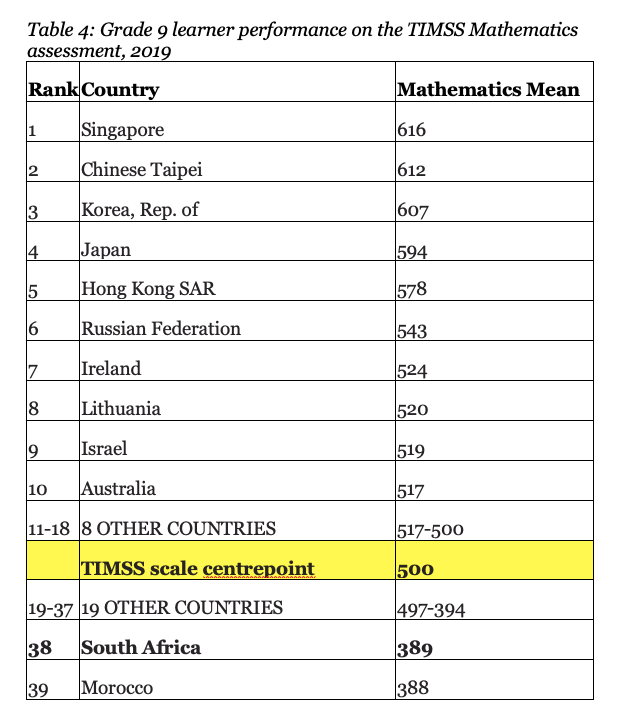Harvard University scholars showed in 2009 that a country’s economic growth was more clearly attributable to the mathematical proficiency of its high school learners than to their proficiency in other subjects.
Encouragingly, the National Education Collaboration Trust (NECT) in South Africa has focused its support to the Department of Basic Education (DBE) on improving the quality of learner outcomes in mathematics (together with languages and science) — its motto, taken from the National Development Plan (NDP), being “committed to ensuring a South Africa where 90% of learners pass mathematics, science and languages with at least 50% by 2030”.
How close are we to achieving that goal?
The DBE has released the 2022 Grade 12 results, which have again shown a poor performance in mathematics. The DBE’s diagnostic report on Grade 12 learner performance in content subjects in 2021 showed that 77% of learners achieved less than 50% in maths in 2021, only a one percentage point improvement since 2017. (There is no point in looking at performance below 40% or 30% when a pass for any subject should be, and is at university, 50%.)
Expressed differently, in 2021 only a quarter of learners achieved above 50% in (that is, “passed”) maths.

The perennial focus on Grade 12 pass rates at the expense of pass rates in the preceding 11 grades points up the continuing myopia of the education authorities in ignoring the bigger picture — the number of learners who start Grade 1 and drop out of school before Grade 12.
As the Research on Socio-Economic Policy (Resep) group at Stellenbosch University has shown, there are “major inefficiencies” in the schooling system, with repetition being “extremely common in all grades” and many learners dropping out of the system before reaching Grade 12.
Pre-Grade 12 performance in maths is a harbinger of maths outcomes in matric. As the following table shows, while learner performance improved over the period 2016 to 2018, performance from Grade 3 to Grade 6 to Grade 9 dropped off significantly. That the average pass rate in Grade 9 was well below 40% explains the Grade 12 maths outcomes profile.

To argue that the improvements in learner performance in maths between 2016 and 2018 show that we are making progress is belied by maths performance in matric (Table 1), which has shown no substantive improvement over the last five years. It would not be overstating the case to say that these figures represent a national disaster — though not, of course, if the Harvard scholars are wrong, economic growth is unimportant, and the future wellbeing of South Africa’s people is of little consequence.
How South Africa fares in relation to other countries whose mathematics performance is measured in the triennial TIMSS (Trends in International Mathematics and Science Study) underscores the picture above.

 Source: Adapted from TIMSS 2019: Highlights of South African Grade 9 Results in Mathematics and Science
Source: Adapted from TIMSS 2019: Highlights of South African Grade 9 Results in Mathematics and Science
The comparisons with developed countries are odious. But to be placed below 13 other upper-middle-income countries (the Russian Federation, Turkey, Azerbaijan, Bulgaria, Kazakhstan, Serbia, Armenia, Albania, Georgia, North Macedonia, Bosnia and Herzegovina, Montenegro, and Kosovo) in the Grade 5 assessment and below six other upper-middle-income countries (the Russian Federation, Turkey, Kazakhstan, Georgia, Malaysia and Jordan) in the Grade 9 assessment shows just how far behind we are.
The solution
The chief reason for the paltry performance of learners in mathematics — Bantu Education and its continuing legacy — is obvious, and will not be dwelt on here, whatever the extent to which subsequent education policy and practice may have aggravated the situation. Precisely because of this legacy, out-of-the-box solutions are needed. For out-of-the-box, read collaboratively daring.
The NDP dwells extensively on the need for collaboration among all education stakeholders if its ambitious targets are to be realised. As shown by Resep researchers in 2020, the target of 90% of learners passing mathematics, science and languages with at least 50% by 2030 is unachievable: even with a healthier rate of improvement than currently observed, it would be difficult to exceed 60% by 2030.
This does not, however, mean that the 90% goal should be jettisoned. It means that additional measures are needed to achieve better outcomes — and ultimately raise the prospect of higher economic growth.
Two-thirds of Grade 5 learners taking maths in 2019 and four-fifths of Grade 9 learners taking maths in 2019 were taught by teachers with a maths specialisation. Clearly, however, maths specialisation does not translate into learner achievement.
More worryingly, years of maths teaching experience does not lead to better learner outcomes. As both TIMSS reports indicate, “there is no significant association between years of experience and achievement”.
The problem, then, is not in the first instance the number of maths teachers, but the quality of their teaching.
Against this stark backdrop, at least the following five actions are needed — not sequentially, but simultaneously — if the quality of maths learner outcomes is to improve. This is where the “daring” comes in.
- Conduct a skills audit of all current maths teachers, paying those who achieve above-average scores on a specially designed test (pitched at Grade 12-level) handsomely — above average teacher pay;
- Attract competent maths teachers to non-fee-paying schools with offers of subsidised accommodation and above-average remuneration;
- Recruit school-leavers with high matric maths marks into teacher training programmes in high-performance universities, offering them free tuition and signing contracts with them for post-degree service (notionally for four years) of one year’s support for every year for which they receive a bursary;
- As a short-term measure, recruit competent foreign nationals to teach maths on a contract basis, relaxing immigration processes and paying them above-average teacher salaries; and
- Engage with teacher unions on the need to drastically increase the number of maths school-leavers with marks good enough to get them into universities to study teaching, impressing upon them (the unions) the need to do this if South Africa is to rise above its present status of producing unemployable school-leavers and graduates and if living standards for the entire population are to be raised.
All of this will require money which the government is likely to say does not exist and union commitment to the wellbeing of the larger community beyond narrow member interests.
Without such money and commitment, South Africa is destined to continue its downward spiral and become increasingly internationally uncompetitive, with little prospect of this trajectory changing. DM
Dr Michael Cosser, an education consultant, was previously with the Human Sciences Research Council’s Developmental, Capable and Ethical State research division.





 (Photo: iStock)
(Photo: iStock)